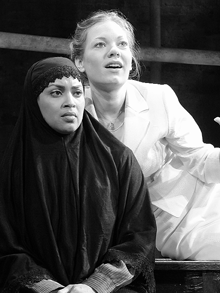Strindberg is updated, but the result makes a hash of an exquisite reading of class and gender
One of the truly unfortunate upshots of mounting plays whose texts are in the public domain is that there is no estate of the playwright to control a production, and when that uncontrolled production is a disaster—as is the case with Strindberg’s “Miss Julie,” now at the Cherry Lane—there is no one that can sue for the desecration of a classic.
Strindberg’s play, which is first and foremost about power and the exercise of that power, was written in the late 19th century. It is an exploration of class and gender and the relative weights of each in human interactions at a time when the structure of society was changing. It is also the story of a dreaming servant, Jean, who wants to be a count and an overly romantic girl, Miss Julie, who confuses lust with love and is not yet sophisticated enough to know that the social order can exist only with the agreement of all the participants. The tragedy is that both Jean and Miss Julie exist at a time of radical social transformations, but they are prisoners of their illusions and those illusions exact a terrible cost—spiritual death for Jean and literal death by suicide for Miss Julie.
There is drama enough in the script as written to provide a compelling evening of theater. For some reason, though, the producers Beowulf Borritt and Jesscia Niebanck have decided to update the show to the present. They have also decided to set the play, according to a production note in the press packet but not in the program, “in an oil-rich country where Miss Julie is the daughter of a Western oil baron and Jean is a low level company man and native of that occupied country.”
This would all be well and good if it made any sense, but it does not, and discovering the production note after the performance did nothing to clarify the muddled mess that was on the stage. It was never clear that this was what was going on…ever. And, in my mind, it still isn’t. I’m not so strict to think that a conceptual production of a classic is overtly wrong, but it is risky. The concept must make sense, it must illuminate the text rather than be imposed upon it, or the whole thing falls apart. As happens here under the direction of Scott Schwartz, the resulting incoherence and blind self-indulgence poison everything on the stage.
Schwartz admittedly has his challenges cut out for him dealing with the inept new translation of the play by Truda Stockenstrom, who has wrung every bit of lyricism out of the play, using contemporary language that takes the dimension out of the characters. It sounds, and is directed, as if Aaron Spelling had taken on Strindberg, maximizing the “T&A” and ignoring the writing. Stockenstrom has lost the distinctions of language that separated the classes and made it impossible that Miss Julie could ever really run away with Jean. He might be raised, but she would be lowered, and it is not a life for which she is willing to make that sacrifice when forced to confront its reality. By making Miss Julie strident and vulgar, Stockenstrom undermines the inherent tension between Miss Julie and Jean so that much of the play makes no sense. Moreover, it is difficult to believe that an aristocratic woman who says, “shit,” “sucks,” and other things even more coarse could really feel that she was “ruined” by having a fling with a servant.
Contemporizing the language may make the script more palatable to modern ears, but it makes hash out of the play.
One wants to be sympathetic toward the cast, but blaming the concept and the translation goes only so far. As Jean, Michael Aronov is the best, but he performs the role in bursts, without any seeming consistency. He is charming enough, but he is never truly believable in either Jean’s passion or his plotting and mostly seems lost. Opal Alladin as the maid Kristen does well with her relatively small part. She is the most ill served by the concept because at the end of a long speech about going to a Catholic mass, she dresses in Muslim attire. Again, the incongruity undermines the moment. As for Mimi Bilinski as Miss Julie, the less said the better. She plays the title character as a borderline psychotic with garbled speech and exaggerated facial expressions worthy of Lucille Ball at her most histrionic, and yet for all that facial excess (no Botox there), I’ve heard computerized phone systems deliver more believable line readings.
One could go on, but why? At one point during the painfully attenuated final scene, a buzzer goes off and Jean answers it. He talks to his unseen master and then announces to Miss Julie that they have half an hour before he needs to answer that call. An audible groan arose in the audience at that prospect.


































